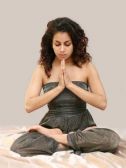
By Dr. Paul Jerard, E-RYT 500
Why are more, and more, students, over 40 years of age, discovering Hatha Yoga classes for the first time? What can Hatha Yoga do for a “couch potato?” What can Hatha Yoga offer the active person, who is over 40? Let’s take a closer look at each of these issues for the deeper answers, which Hatha Yoga contains.
There are many styles of Yoga, and Hatha Yoga is just one of the nine main styles from India. Hatha Yoga has many sub-styles, such as: Vinyasa Yoga, Restorative Yoga, Iyengar Yoga, Kripalu Yoga, and many more. Before we go too deeply into this subject, please realize that outside of India, the most common form of Yoga is Hatha Yoga.
Why are more students over 40 discovering Hatha Yoga classes for the first time?
Recently, I’ve seen an influx of Yoga students, at our Attleboro Yoga Studio, who have been inactive for decades, but decided to make a “life change” to improve their health. As a result, they become physically active in Hatha Yoga classes and continue to practice their Yoga training at home.
Some of our new Yoga students arrive, due to a physician’s referral, but many have researched Yoga. Their research caused them to make an independent decision to improve their health on a mental, physical, spiritual, and emotional level.
As we approach middle age, body weight is harder to get rid of than it ever was. As a result, this extra weight can bring us many health problems and diseases.
In fact, shedding 10 or 20 pounds of body weight may just extend your life span. Heart problems, high blood pressure, diabetes, some forms of cancer, and more diseases, prey on those of us who carry extra pounds around.
So, we are not considering living at a nursing home for an extra decade, but increasing our odds to have an active and quality life to the end.
What can Yoga offer the active person, who is over 40?
For those of us who have been exercising for decades, we realize there is a flaw in the “No pain, no gain” theory. Premature joint wear is the biggest problem. For most of us, recognizing the difference between muscular and joint pain comes with age.
Therefore, the new fitness motto for middle age should be, “Work smart, not hard.” This requires a bit of research, as to which style of Yoga is most suited to your body and then finding a compassionate Yoga teacher. One class can tell you if the style is to your liking. As for Yoga teachers: It is easy to recognize a Yoga teacher who is abusive from one who is not.
However, some people are very attracted to a Yoga teacher who will “push them.” Be careful if you fall into this category. A Yoga teacher is not a coach, whose goal is to push you to the next competitive level.
It is fine to have goals in life, but take the time to research your individual needs. Make sure the Yoga teacher, and the Yoga style, you choose will fit into your lifestyle. Yoga’s principles are more about training for longevity than training for a short-term gain.
© Copyright – Aura Wellness Center – Publications Division
To see find out more about yoga or see our selection of affordable yoga teacher training courses, please use the yoga resources on the right side of this page.
To see find out more about yoga or see our selection of affordable yoga teacher training courses, please use the yoga resources on the right side of this page.
If you are a teacher, yoga studio manager, blogger, e-zine, or website publisher, and are in need of quality content, please feel free to use my blog entries (articles). Please be sure to reprint each article, as is. Namaste!



